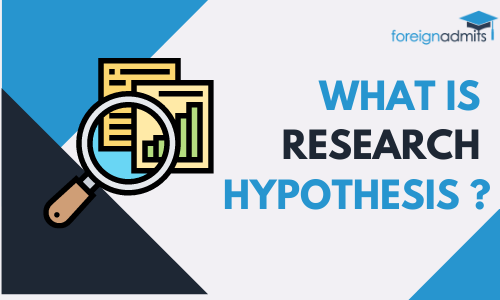A research hypothesis (also called a scientific hypothesis) is a statement about a scientific study’s expected outcome. It should be a precise and testable statement. A reasonable hypothesis converts the research question into a specific statement about the relationship between two or more research variables to predict an expected outcome. It must be very clear about what’s being assessed (who and what is involved) and very specific about the desired effect. It is essential to know about the research hypothesis and its type to every researcher.
The Purpose Of Research And Its Characteristics
What are all the types of Research Hypothesis?
Defining the research hypotheses is one of the crucial steps in framing a scientific quantitative research study. Further, it can be classified into Directional, Non-Directional Hypotheses.
Non-Directional Hypothesis
A non-directional hypothesis, in statistics, happens as a hypothesis used to prove (or disprove) that changing one variable affects another variable. It does not ask whether the effect is positive or negative – see directional hypothesis for that kind of thing. The non-directional hypothesis is a two-tailed hypothesis where the direction of prediction is not specified.
Directional Hypothesis
A directional hypothesis is a researcher’s prediction regarding a positive or negative change, relationship, or difference between a population’s two variables. This prediction is typically based on past research, accepted theory, extensive experience, or literature on the topic. Keywords that distinguish a directional hypothesis are: higher, lower, more, less, increase, decrease, positive, and negative. The directional hypothesis is a one-tailed hypothesis that uses the characteristics of the independent variable’s effect on the dependent variable to predict the impact’s exact direction.
Is a career in analytics and research good for you?
Furthermore, there are other two types of Hypothesis
Alternative Hypothesis (HA)
The alternative hypothesis is a position that states something is happening. A new theory is preferred instead of an old one (null hypothesis). It is usually consistent with the research hypothesis because it is constructed from literature review, previous studies, etc. The alternative theory states the effect of a relationship between one variable to another variable. In this, the study results are not due to the chance of occurrence in the study.
Also, we accept the alternative hypothesis if the null hypothesis is denied. We do not accept the alternative hypothesis if the null hypothesis is not rejected.
Null Hypothesis (HO)
It states that there is no relationship between two population parameters, i.e., an independent variable and a dependent variable. If the hypothesis shows a connection between the two parameters, the outcome could be due to an experimental or sampling error. However, if the null hypothesis returns false, there is a relationship in the measured phenomenon, which means one variable does not affect the other variable. It claims that the findings are purely coincidental and have no presence in the hypothesis’s validity being investigated.
Visa Process for Germany – All you need to know!
Important FAQs
1. When should a null hypothesis be rejected or accepted?
If the statistical analysis shows that the significance level is below the cut-off value we have set (e.g., either 0.05 or 0.01), we reject the null hypothesis and accept the alternative hypothesis. Moreover, if the significance level is above the cut-off value, we fail to reject the null hypothesis and not get the alternative hypothesis.
2. What is the importance of hypothesis in research?
It is essential to hypothesise in the primary research to know what you will test in your study and whether your research rejects or accepts this hypothesis.


